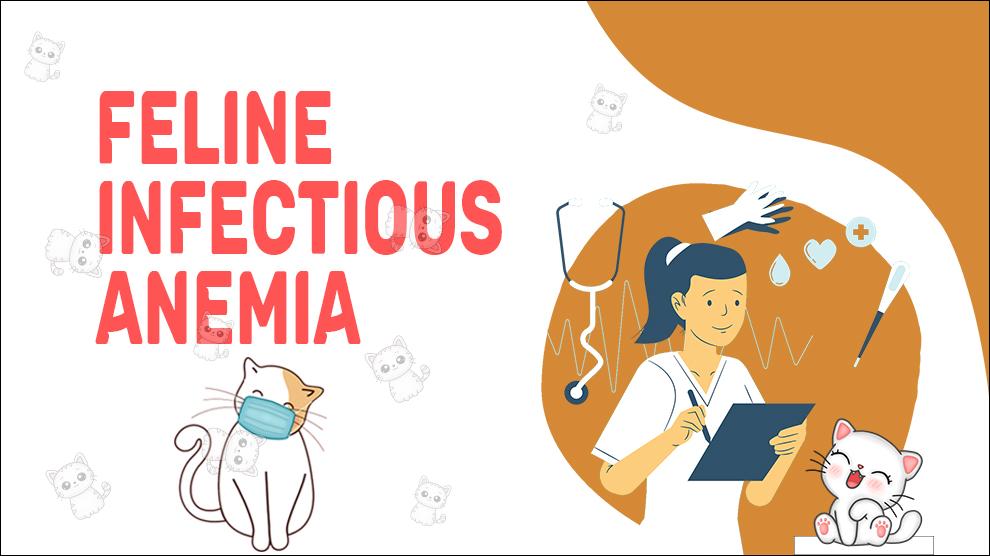What Is Feline Infectious Anemia?
Feline Infectious Anemia (FIA) is a condition that affects cats and is caused by a parasite known as Mycoplasma Haemofelis.
The parasite attaches itself to the surface of red blood cells, leading to the destruction of the cells and anemia.
The condition is more commonly found in outdoor and stray cats but can also affect indoor cats.
The severity of the disease can vary from mild to severe, and in severe cases, it can be fatal.
Clinical Signs Of Feline Infectious Anemia
The symptoms of FIA can vary in severity depending on the stage of the disease.
Some of the most common symptoms of FIA include:
- Lethargy and weakness
- Anemia (low red blood cell count)
- Pale gums
- Loss of appetite
- Weight loss
- Fever
- Jaundice (yellowing of the skin and eyes)
- Enlarged spleen
- Fatigue
- Rapid Breathing
- Rapid Heartbeat
- Depression
If your cat exhibits any of these symptoms, it is important to see a veterinarian right away for a proper diagnosis and treatment.
Treatment Options For Feline Infectious Anemia
The treatment of feline infectious anemia depends on the severity of the disease.
In mild cases, supportive therapy may be all that is necessary. This includes keeping the cat warm, providing a nutritious diet, and ensuring that the cat is adequately hydrated.
In more severe cases, blood transfusions may be necessary to replace the red blood cells that have been destroyed.
Antibiotics may also be used to treat secondary infections. In some cases, immunosuppressive drugs may be prescribed to treat autoimmune hemolytic anemia.
Home Remedies For Feline Infectious Anemia
There are no home remedies for feline infectious anemia. The disease requires prompt veterinary treatment.
How To Prevent Feline Infectious Anemia?
Preventing feline infectious anemia involves taking steps to reduce the risk of exposure to the parasite that causes the disease.
Cats should be kept indoors or in a screened-in area to reduce their exposure to fleas and ticks. Regular use of flea and tick preventives can also help reduce the risk of infection.
Cats should be tested for feline infectious anemia before being introduced to a new home or before being allowed to mate.
If a cat is diagnosed with the disease, it should be kept separate from other cats to reduce the risk of transmission.
Affected Cat Breeds Of Feline Infectious Anemia
All breeds of cats are susceptible to Feline Infectious Anemia, but the condition is more commonly found in outdoor and stray cats.
Causes For Feline Infectious Anemia
Causes:
Feline Infectious Anemia is caused by the parasite Mycoplasma Haemofelis, which attaches itself to the surface of red blood cells, leading to their destruction and anemia.
The parasite is spread through contact with infected cats, typically through bites from fleas, ticks, or other blood-sucking insects.
The condition is more commonly found in outdoor and stray cats, but indoor cats can also become infected.
When To See A Vet For Feline Infectious Anemia?
If you notice any of the symptoms of feline infectious anemia in your cat, it is important to take it to the vet as soon as possible.
The disease can be fatal if left untreated, so early diagnosis and treatment are essential.
Food Suggestions For Feline Infectious Anemia
A nutritious diet is important for cats with feline infectious anemia. Cats should be fed high-quality commercial cat food that is high in protein and easily digestible.
It is also important to ensure that the cat is adequately hydrated.
Conclusion
Feline infectious anemia is a serious disease that can be fatal if left untreated.
The disease is caused by a parasite that is transmitted by fleas and ticks. Symptoms of the disease include lethargy, weakness, pale gums, and loss of appetite.
Treatment of the disease involves supportive therapy, blood transfusions, and antibiotics. Preventing the disease involves reducing exposure to fleas and ticks and regular use of flea and tick preventives.
If you suspect that your cat has feline infectious anemia, it is important to take it to the vet as soon as possible for diagnosis and treatment.











